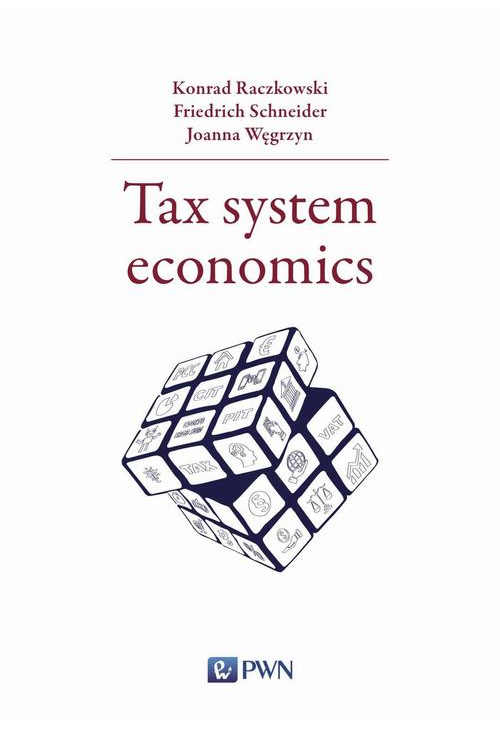
- -11%
ebook Tax system economics
Wyrusz w intelektualną podróż po ekonomii systemu podatkowego, odkrywając tajniki skomplikowanego świata podatków i ich wpływu na gospodarkę. Poznaj teoretyczny model systemu podatkowego oraz jego praktyczne zastosowanie w globalnej ekonomii. Autorzy, Konrad Raczkowski, Friedrich Schneider i Joanna Węgrzyn, przedstawiają nowoczesną analizę ekonomiczną systemu podatkowego, opartą na innowacyjnych badaniach i aktualnej wiedzy naukowej.
W swojej książce "Tax system economics", wydanej przez Wydawnictwo Naukowe PWN w 2023 roku, autorzy skupiają się na efektywności podatków z perspektywy dobrobytu społecznego, zaufania do władz oraz równowagi między rozwiniętymi i rozwijającymi się gospodarkami. Dzięki temu publikacja staje się nieocenionym źródłem wiedzy dla ekonomistów, przedsiębiorców oraz osób zainteresowanych zagadnieniami podatkowymi i ich wpływem na gospodarkę.
Dowiedz się, jakie rodzaje podatków mają największy wpływ na ekonomię oraz jak behawioralne aspekty decyzji o płaceniu podatków rzutują na ogólną efektywność systemu podatkowego. Poznaj model mentalnego księgowania w kontekście podejmowania decyzji podatkowych według Richarda Thalera oraz analizuj, jak system podatkowy wpływa na zaufanie społeczne i skuteczność działania władz.
"Tax system economics" to również przewodnik po wyzwaniach stojących przed systemami podatkowymi w erze cyfryzacji i robotyzacji, a także konflikcie między rozwiniętymi a rozwijającymi się gospodarkami. Publikacja ta jest szczególnie aktualna w obliczu poszukiwania nowych źródeł dochodów przez państwa dotknięte kryzysem pandemicznym.
Beata Javorcik, profesor ekonomii na Uniwersytecie Oksfordzkim i główna ekonomistka Europejskiego Banku Odbudowy i Rozwoju, podkreśla aktualność tematu: "Ta książka nie mogła być bardziej potrzebna. Państwa wychodzące z pandemii zadłużone będą analizować swoje systemy podatkowe w poszukiwaniu nowych źródeł przychodów."
Zanurz się w fascynującym świecie ekonomii i odkryj, jak efektywnie zarządzać systemem podatkowym. Pobierz swoją kopię "Tax system economics" już dziś i rozpocznij czytanie w wygodnym formacie ebooka!
Spis treści ebooka Tax system economics
Foreword 7Chapter I. The role of taxes and tax system in economic science 11
Introduction 11
1.1. The tax system as an economic category 13
1.2. The economic concept of tax and tax system 15
1.3. Principles of taxation 19
1.4. Goals of tax system 24
1.5. Tax system models 28
1.5.1. A neutral tax system model 35
1.5.2. A stimulating tax system model 36
1.5.3. A theoretical tax system model addressing the challenges of the contemporary economy 38
1.6. National tax policy in the global economy 42
1.6.1. Macroeconomic governance of a tax system 47
1.6.2. Global tax governance 49
Conclusions 54
Chapter II. The tax system in the economy 57
Introduction 57
2.1. A tax system that fosters economic growth and development 59
2.2. Fostering prosperity and limiting social exclusion 72
2.3. Public tax administration 84
2.4. Significance of taxes in the economy 88
2.4.1. Personal income tax 94
2.4.2. Corporate income taxes 101
2.4.3. The role and importance of consumption taxes 106
2.4.4. The role of property taxes 111
Conclusions 115
Chapter III. Economic analysis of tax system 117
Introduction 117
3.1. The tax system in a theoretical macroeconomic analysis 119
3.2. The tax system in a practical macroeconomic analysis 130
3.3. The tax system in a simplified financial analysis 144
3.4. An economic analysis of taxation and of informal economy 149
3.4.1. Tax system and the shadow economy 149
3.4.2. A research approach to estimating the shadow economy 154
3.5. Economic analysis of law in tax system and economic policy 157
3.5.1. The research concept and methodology in economic analysis of law 160
3.5.2. Criticism of economic analysis of law—pros and cons 166
Conclusions 168
Chapter IV. Behavioural economics in the tax system 171
Introduction 171
4.1. Why behavioural economics in taxes? 173
4.2. Power and trust in the tax system—a social or economic problem? 177
4.3. Social and economic variables driving tax behaviours 182
4.4. The decision-making architecture in the tax system—the nudging strategy 187
4.5. Behavioural tools and technique in the tax system 192
4.6. Tax system effectiveness—verifying the mainstream economics paradigm 197
4.7. Suggested tax system efficiency model 204
Conclusions 208
Chapter V. Tax system economics of the future 209
Introduction 209
5.1. A tax system oriented to the growth and development of innovative economy 210
5.1.1. The impact of the tax system on a highly-innovative economy 225
5.1.2. Adequacy of the solutions used in tax systems for the growth rate in innovative economy 231
5.1.2.1. Impact of taxes on the annual GDP per capita growth 231
5.1.2.2. Gross fixed capital expenditure 235
5.1.2.3. Gross R&D expenditure 238
5.1.2.4. New technology exports 241
5.1.2.5. Gross domestic savings 244
5.1.2.6. Foreign direct investments 246
5.1.2.7. Number of researchers 247
5.1.3. Taxpayer acceptability of the tax burden amount 249
5.2. Globalisation, digitalisation and tax system 250
5.3. Robotisation and tax system 258
Conclusions 262
Summary 265
Bibliography 269
List of tables 313
List of figures 315
Szczegóły ebooka Tax system economics
- Wydawca:
- Wydawnictwo Naukowe PWN
- Rok wydania:
- 2023
- Typ publikacji:
- Ebook
- Język:
- angielski
- Format:
- epub mobi
- Tłumaczenie:
- Joanna Łuczak
- Liczba stron:
- 320
- Miejsce wydania:
- Warszawa
- ISBN dla wersji papierowej:
- 9788301226633
Recenzje ebooka Tax system economics
-
Reviews (0)

Na jakich urządzeniach mogę czytać ebooki?
- -11%



















@CUSTOMER_NAME@
@COMMENT_TITLE@
@COMMENT_COMMENT@